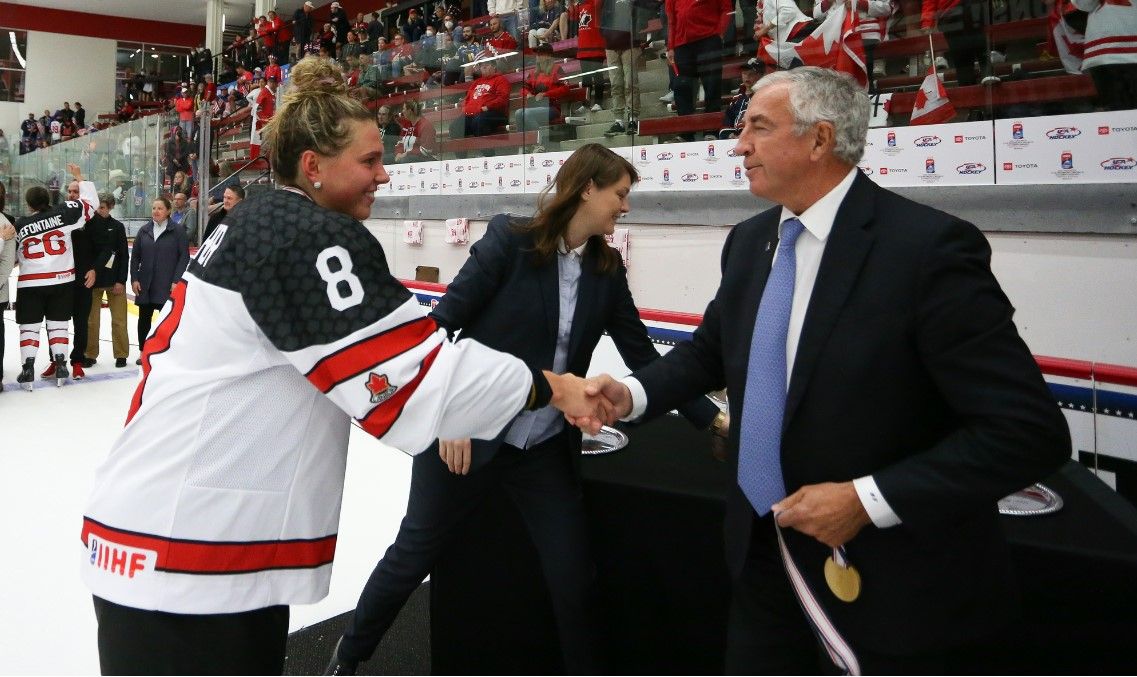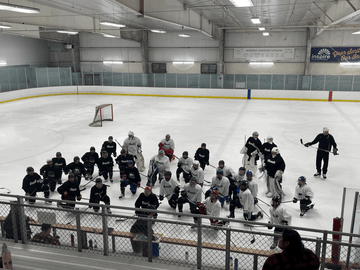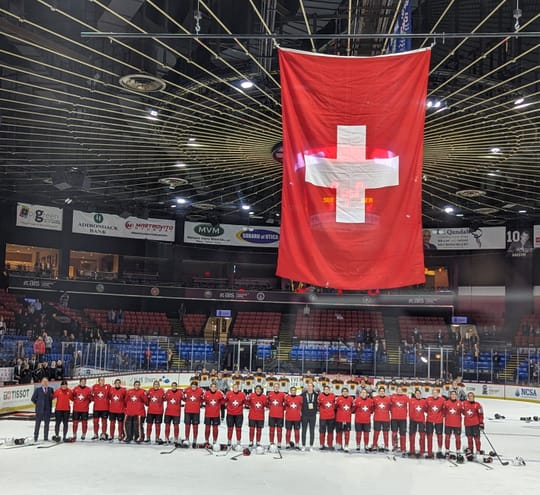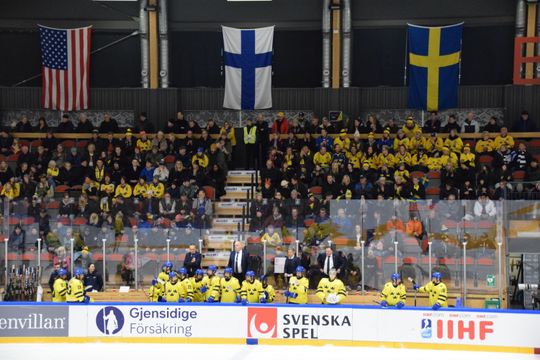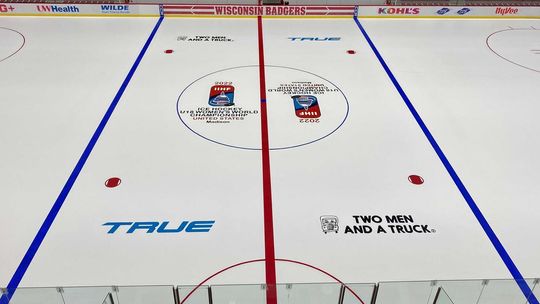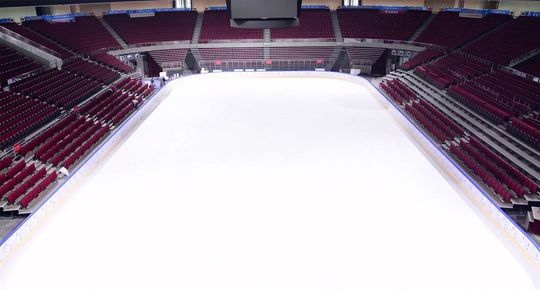IIHF President Luc Tardif was made available to press for a short interview during intermission of the bronze medal game at the the U18 IIHF Women's World Championships in Madison on June 13.
Below you'll find a transcript of that conversation as well as the audio Nicole recorded while speaking to Tardif. The other reporter in this interview is Todd Milewski, who covers University of Wisconsin men's and women's hockey in Madison for the local newspaper, The Wisconsin State Journal.
The questions and answers have been lightly edited for clarity. Note that Luc Tardif's first language is French, not English, so transcription reflects his original words and we may add additional clarification in brackets when necessary.
Listen:
Transcript:
Todd Milewski: What kind of organizing have you seen being done here and how it's run?
IIHF President Luc Tardif : First, I just arrived for the semifinal and final. But I've been in touch with the Chairman since the beginning. I'm not surprised that the organization is at the level of the competition, because the venue is fantastic. I think all the delegation of the teams, they're going to go back home and they will dream about where this competition was played. A venue like that with dressing room and the organization, that's really fantastic.
I think, even if we had to postpone this tournament – because we were supposed to play in January – to play in this condition, I think the girls were happy, even if it's June, an unusual time. So far, there is this, this game to finish and the other one, but that really good organization. I congratulate USA Hockey for the work done. It's fantastic.
Nicole Haase: What were the plans in terms of why we were okay with just canceling and not rescheduling back in December and January?
Tardif: You're going to have to get used to that, because I will always cancel and after that, find a solution. I always did like that. Because when you postpone, there is a lot of people watching you. When you cancel, you get more people to help you. So that's what we did, also, for the senior [Women's World Championship] in Canada, in Nova Scotia. We canceled. We took a month after that to find a way. That was two years or three years ago, we played in Calgary. This way, we find a solution.
But we didn't have only one tournament to bring somewhere else, we had four tournaments, plus two for the men and so six. We have to take our time. When that happened, I know a lot of people were not happy. And I said judge me in the end. Give us time to work, and after that quickly, at the end of the summer all those tournaments will be played.
Milewski: Is there a path toward making this tournament – the U18 Women's specifically – bigger on this kind of scale year after year? I know a lot of that is up to individual federations and how they stage the event. But does having an event like this help set a standard higher in your mind? And how do you communicate that to other federations who put on this tournament in the future?
Tardif: Since since about 10 years, really all the tournaments – I mean the top division and Division 1A – we've really improved. The venues are much better. Those countries compete and they get used to a higher level because they play in Group A. Sometimes they go in back in Division 1A. It took some few years of experience to bring your organization at the level. That's why that's important. Big federations like Hockey Canada, the leader helps to bring to the top all those countries. I think yesterday we saw two big games [the semifinals between the US and Sweden and Canada and Finland]. We know a lot of people say, "Yeah, but women's hockey, that's always Canada against USA at the final."
But yesterday [in the U18 Women's semifinal], those who saw the teams, they were happy to win. And usually Finland and in Sweden when they play well against Canada and the score is not that bad, they're happy. But yesterday they were disappointed. And that was not that far. Women's hockey is growing stronger and stronger. Russia are not playing, but they are at the level, also. The leagues improve also in Europe. So that means take our time. In 10 years, we're going to have not only to to compete, but maybe 10. The level of the organization will grow up at the same time.
Haase: Are there any thoughts to expanding the size of the field for the top tier in U18? You expanded at the senior level. Is there any thought to doing that at U18?
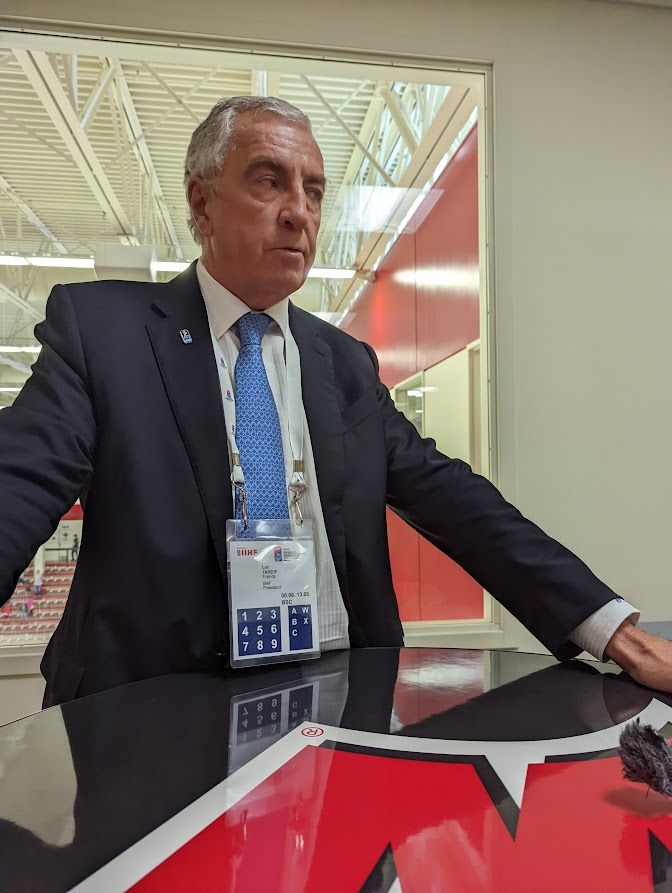
Tardif: We have to take our time, not go too fast because sometimes the result is not the same. So that means, what I saw and the discussion I had with the Chairman today, I think the levels seem to be close to each other. So that means, maybe, why not. I think we're not completely ready right now to add two more team like we did for the Olympic Games. But we have to do that smartly. Not too early, but push, also some other country to the top level. But every year we check and what we saw yesterday for the semi finalists, it's interesting for us to continue this way.
Milewski: You've been clear in the past that there's a financial component, too. You're running an organization that has to look at at finances. What do you think it will take for women's hockey and these tournaments to become financially self-sufficient? Is that something you you look forward to as a potential and something that can then make the tournaments on bigger stages?
Tardif: On one side, the biggest progress for the number of players is on the women's side. That's internationally. I'm talking about the number.
We've got more and more countries interested in women's hockey. I'm not going to talk about the professional league because that's not my business. I think we are not that far to ever professionally there is professional league in Sweden, in Finland, but that's more semi-professional, but that's professional. In Germany and Switzerland a little bit also. What is good is they will grow by the level, but also financially. Because if you want to be a professional league like the NHL all of a sudden, that's not going to work. We have to step slowly. You have to be prudent about salary because that's a business. When there is a professional league, that's a business. You have to balance the interest, the sponsors.
Federations are involved. For the most part, big federations they are involved in the women's hockey. Like Finland, like Sweden. You can see they improve. They've got training camp. They've got good staff. They've got a good coach. There is an investment about women's hockey.
The business should make this investment. For the first time, the Chinese following the the the Olympic Games, they gave us an offer to for the next three years to organize Division 1A, and they will give us $9 million. We finalized the contract.
That's the first time a country did the investment like Hockey Canada is doing for under 20 [World Juniors] and I would like to do also under 18 here in USA with NHL. For the women, that's the first sign of an investment.
So coming back to professional. I used to say in French there is a saying Aide-toi et le ciel t'aidera. Help yourself and the sky will come blue. [1] So that means I think the girls they don't have to wait on the NHL, they have to do it themselves. So start slowly and invest and try to convince people and maybe at the beginning have the salary of the business. I think there is some people they they can – like USA Hockey – I'm sure they are ready to be involved maybe on the human resources, for statistics, for schedule to start. In Canada, they already fail [with the CWHL]. But I think that's the time to come back. USA and Canada, they should work together. They should work together.
Haase: Are there any thoughts to having U20 for the Women?
Tardif: Yes, yes.
Haase: What kind of timeline are you talking about?
Tardif: We have already started. But we need statistics [to know] if we have enough U20 players because if we take the girls who are under 18 and they play three tournaments, that's not what we want. So we're not that far. We started to discuss about out it in the women's committee, but the pandemic, war in Ukraine ... please give us time. But we've got that in the head and we will do it. When? I cannot answer this question. So you will have to be satisfied by my first answer.
Milewski: Is there a potential that this – the U18 women's tournament – could be a North American-based tournament in the future? Like how the senior Men's World is in Europe because of scheduling.
Tardif: The top tournament that's not here because USA and Canada never ask for it. We came last time that was in Quebec in 2008. That was a success. But that's a competition with NHL, and there is a kind of an unwritten agreement. I don't know. But for the women, we're not going to have this problem. But that's why I think the Chinese, who want to organize Division [1A] – I hope they will give an idea for some other kind of contract also for the woman. So we are going to be ready for it.
Milewski: You wouldn't be opposed to someone saying, "We want to do this every year?"
Tardif: If you want to organize in Wisconsin every year, that's not a problem for me.
Haase: My last question is just about bonuses and equity between payout between men and women. Your French Federation that you used to run just agreed to even it out between the men and women regardless of what the IIHF was paying.
Tardif: That's not going to be tomorrow. When we had to cancel this tournament, I was not happy because nobody gave us time to ... and we had to stop the World Junior tournament at the moment. And that was a good decision not to organize the tournament in January without any protocol. That was suicide. We stopped.
And I think all the women of the world wrote me.
In four months, we bring 5 million euro more for the Olympics support. Five million in four months. And nobody saw. But when I came back I said "Hey, girls." We had to take our time and at least look what we are doing. We got a new contract of InFront Marketing in 2025. We go step by step at the level of what we can do. But we have in mind to to push this way. But trust us. You don't have any other choice.
[1] A more accurate translation of this from French is probably "help yourself and heaven will help you." Kirsten Whelan assisted with this translation.
(Photo: IIHF)
